![]()
Home | Crosswords | Word Searches | Flash Cards | Verbs | Songs | Creative Writing | Work Sheets | Phonics | ABCs
Potion Book | Spell Book | ESL for Adults | Ask Thomas | Lesson Plans | Young Learners | Jobs |

An Activity for Teaching Reported Speech
The main activity for this section is Reported Speech Soccer. The game is really meant for small groups (between 2 and 8) as it is essential that the teacher referees. The game goes as follows:
(1) The teacher prints a set of quotation cards (see Soccer Matches Below) and a game board. The quotation cards should be pasted onto cardboard and cut out.
(2) The class is divided into two teams (or the whole class can play as one team against the teacher).
(3) Teacher places a marker on the soccer field to represent a soccer ball.
(4) There are three ways the teacher can proceed from here:
(a) If it is the first game, the teacher can flip over a quotation card and the student whose turn it is reads the quote and reports what was said, heard, read, or thought. For example, if the card say "it's a beautiful day" then the student will say, "He/she said that it was a beautiful day." Every card has been designed so that the student can easily identify the pattern that is required.
(b) Once the students get good at it, the teacher can just read the card to the student instead of flipping it over and letting the student read. The teacher will have to act out the card as well. For example, if it's a 'whisper' card, then the teacher will whisper the quotation and the student will have to say, "He/she whispered that . . ."
(c) The third way --my prefered way now-- is to have one student pick up a quotation card and read it to his/her partner. The partner then must report to the teacher what was said.
In both (b) and (c) above it is important to get a set of gestures down to help the student who is listening guess which pattern is required. For example, if the pattern is "heard that" then the student who is speaking should put his/her hand to his/her ear and read out the quote. If the pattern is "yell that", the student can make a clenched fist and read the quote loudly. Both "think that" and "wonder if/what" can be done with a finger tapping on the temple of the head.
(5) If the student correctly reports what was in the quotation, the soccer ball advances one space (one player) closer to the opposing net. If the student makes even the slightest mistake then the ball moves one space closer to his or her own net. Alternate between players from each team.
(6) If you decide to have the whole class play against the teacher, the teacher will go around the group and they will try one at a time to report what was said. If the student reports correctly, the ball moves towards the teacher's goal. If the student makes a mistake, then the ball moves towards the students' goal.
Match #1: The Basic Five and 'That' Noun Clauses:
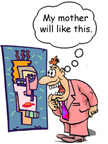
He thought that his mother would like it.
. . . said that . . .
. . . thought that . . .
. . . heard that . . .
. . . wrote that . . .
. . . read that . . .
Match #2: Different Ways to Say Something:
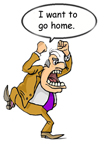
He yelled that he wanted to go home.
. . . bragged that . . .
. . . complained that. . .
. . . confessed that . . .
. . . denied that . . .
. . . whispered that . . .
. . . yelled/shouted that . . .
Match #3: Questions and Reported Speech
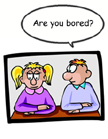
He asked her if she was bored.
. . . ask if . . . (Yes/No Questions)
. . . ask what . . . ('Wh' Questions)
. . . wonder if . . .
. . . wonder what . . .
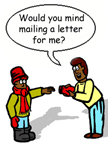
She asked him to mail a letter.
. . . tell someone to . . .
. . . warn someone to . . .
. . . advise someone to . . .
. . . ask someone to . . .
. . . beg someone to . . .
Match #5: Threats and Promises
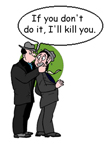
He threatened to kill him.
. . . promised to. . .
. . . threatened to . . .
. . . agreed to. . .
. . . refused to . . .
. . . offered to . . .
Grammar note: When reporting someone's speech you usually change any present tense form into the past tense, For example, "I will go" becomes "He said that he would go." If it is already in the past tense, then it just stays as the past tense. This rule of changing into the past tense is not a strong rule. Sometimes you can leave it in the present tense as well. It really depends on the distance between when something was said and when someone reported what was said. And so if you report the speech right afterwords, you can leave it in the present tense. You can also leave it in present tense when you are talking about things that are true in general. But when I play this game with my students, I always force them to change it into the past tense.
Reported speech has been a difficult grammatical structure to teach well. What is contained in the above links is a description of the various forms of indirect reported speech and very extensive resources and aids for teaching indirect reported speech. Be warned, however, that this lesson is structural (grammar-based) in nature. But it is also very worth doing. The resources are considerable. Thanks go to Yoda for design, to Cam for discussions and encouragement on reported speech and to Sunmi for her exhausting search on ways to say, "He said that . . .
All materials (c) 2007 Lanternfish ESL